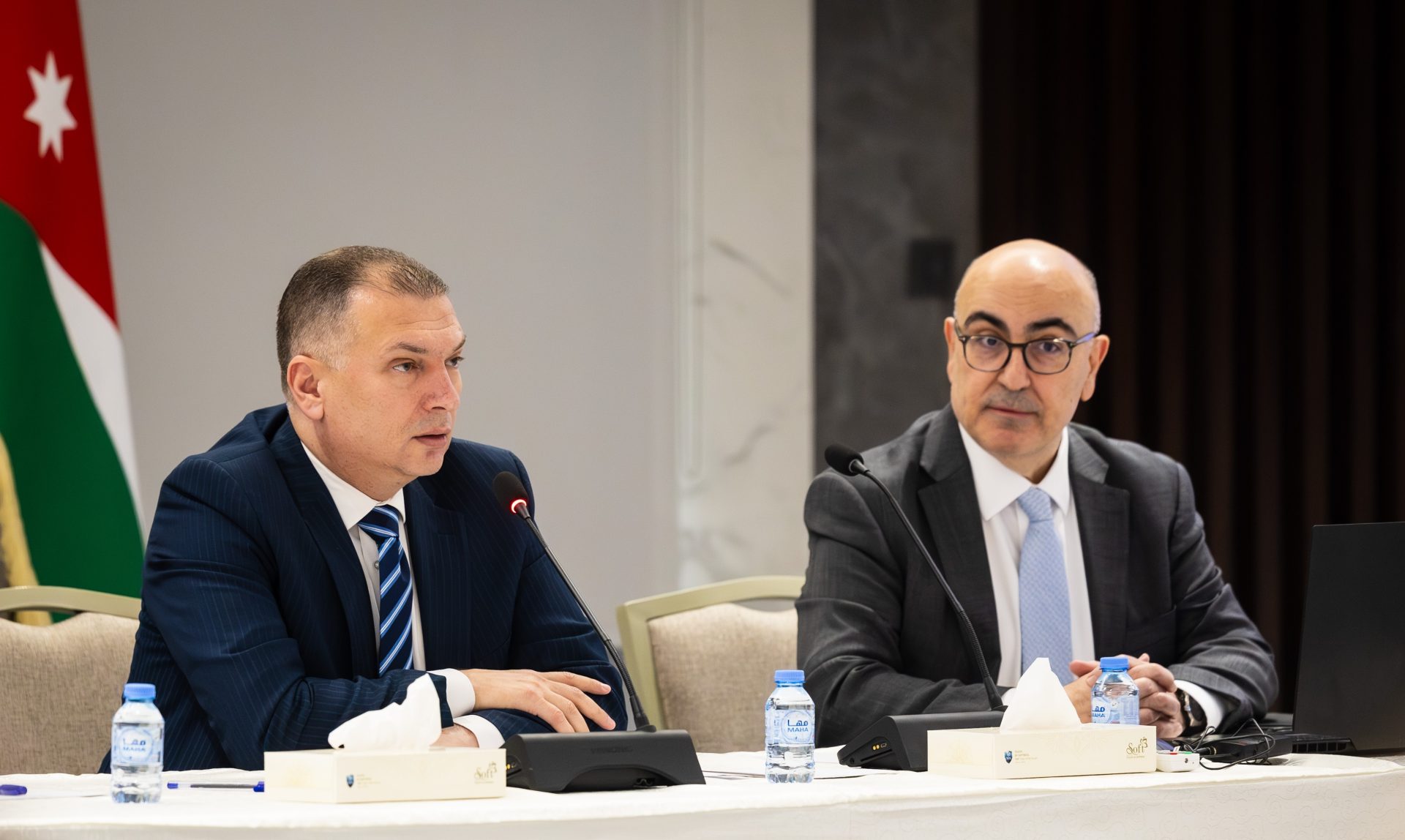
- Governor of the Central Bank of Jordan stresses the critical role of the financial sector in adapting to the effects of climate change.
- Sharkas reveals the start of work on a comprehensive strategy for green financing in Jordan.
- The Central Bank of Jordan aspires to make its green financing strategy a model to be followed in the Middle East.
- Sending the initial draft of the green financing strategy to key partners for their feedback.
- The official joining of the Central Bank of Jordan to the global financial system preparation network in 2021.
- Al-Salam refers to the importance of green sectors and green finance in promoting economic growth.
- Al-Salem: Confirmation of ABJ’s cooperation with the project to enhance activities in industrial facilities in Jordan to provide training programs.
The activities of the first edition of the Green Finance Forum in the banking sector “Griffin” were launched today at ABJ headquarter under the title “Green Finance: Setting the Stage”.
The event was held under the patronage of the Governor of the Central Bank, Dr. Adel Sharkas in the presence of the Minister of Environment, Dr. Moawiya Khaled Al-Radaydah and ABJ Chairman, Bassem Khalil Al-Salem.
Many prominent figures in the banking sector participated in the forum including a number of bank directors, general managers and a number of banking department directors.
Dr. Adel Sharkas, stressed during the event organized by ABJ in cooperation with the Project to Promote Green Activities in Industrial Facilities in Jordan (GAIN) implemented by (GIZ) and funded by the Federal Ministry for Economic Cooperation in Germany and the Frankfurt School of Finance and Management on the key role that the financial sector can play in adapting to the effects of climate change and facing the ensuring environmental and economic challenges.
Dr. Sharkas said: “Managing the risks of climate change requires the regulatory authorities to take exceptional measures that include integrating these risks into their control and precautionary policies.”
He added that this will contribute to directing banks and financial institutions to include these risks in their credit and investment policies, thus, enhancing the role of green finance.
The governor referred to important developments in this regard, saying: “The Central Bank of Jordan began in 2022, in cooperation with the World Bank, to work on preparing a comprehensive strategy for green financing due to the increase of climate change risks in coordination and partnership with the banking and financial sector as well as relevant parties.”
Dr. Sharkas revealed that work on this strategy has been started in 2022, pointing out that it will be the first of its kind in the Middle East and it will serve as a model to be followed by Arab countries.
He indicated that the strategy will cover the banking sector, insurance companies and microfinance companies including plans to promote green finance and reduce climate change risks.
He added, “The initial draft of the strategy has been sent to ABJ and key partners for their feedback in preparation for the official launch.”
In the international context, the governor said that the Central Bank of Jordan joined the global financial system preparation network in 2021 with the aim of strengthening the global response to achieve the goals of the Paris climate agreement and enhancing the role of the financial system in managing the risks of changing paradigms and directing capital towards green investments.
Al-Salem said that the Green Finance Forum is being held for the first time in the ABJ’s headquarters pointing out that the followed economic vision relies on sustainability as an essential part of achieving its goals.
Al-Salem pointed out that green finance and sectors play a crucial role in the Jordanian economy and in enhancing levels of economic growth as well as tackling major challenges.
He further stressed that such a vision requires appropriate financing supporting the transition to a green economy through environmentally friendly investment and financing tools and products.
Al-Salem spoke about the efforts made by the Central Bank of Jordan since 2021 in preparing to launch the green financing strategy considering that ABJ was keen to adopt and promote such a concept which led to the launch of the Green Finance Committee including nine banks.
Al-Salem stressed the association’s cooperation with the project to enhance activities in industrial facilities in Jordan to provide specialized train the trainers programs to committee members in the field of green finance. 150 banks employees were trained in various green financing concepts.
The Chairman concluded by stressing that the forum is an attempt to provide a platform for dialogue between the various stakeholders ensuring the integration and consistency of the efforts made by the Central Bank, banks and government agencies adding that it aims to provide sufficient impetus to integrate the concept of green financing within the banks’ strategic directions.
The first session was held on the sidelines in which the Executive Director of the Financial Stability Department at the Central Bank, Muhammad Amayreh, spoke about the steps taken by the Central Bank of Jordan in the field of green financing and climate risk management.
Amayreh said: “In October 2021, we joined the Central Bank’s green financing program and the international NGF stand GFS connect network which enhances the role of the financial sector in directing financing towards environmentally friendly innovations and climate risk management.
He added: “About two years ago, we at the Central Bank of Jordan began developing a comprehensive strategy for green financing representing a future roadmap and identifying the actions to be taken to promote green financing and strengthen climate risk management. In November 2021, we began collecting data and evaluating current practices in Jordanian banks in the field of green financing and climate risk management.”
He said: “In June 2022, we began, in cooperation with the World Bank, to develop a comprehensive strategy for green financing as it aims to transform the financial sector in Jordan into a regional leader in green financing and climate risk management.
He pointed out that the strategy relies on two main pillars: strengthening climate risk management in the banking and financial sector and promoting green financing.
He noted that the vision of the Central Bank aims to transform the financial sector in Jordan into a leading force in driving green finance and enhancing the ability to withstand climate and environmental risks enabling Jordan to become a regional pioneer in sustainable finance.
He pointed out that the Central Bank will develop a comprehensive program to enhance capabilities in the banking and financial sector to enhance the capabilities of those working in the field of climate change and green finance.
He stressed that capacity building and training for all workers in this field is the cornerstone for an effective implementation of the green financing strategy.
Professor Ulf Mosliner, a German expert and professor at the Frankfurt School of Finance and Management presented his vision during the second session on green finance and the challenges facing this field.
Mosliner said: “When I think about green finance as an academic expert, I notice that many countries and institutions have started in this field, but no region, country or institution has yet reached the desired level.
He added, “I would like to talk a little bit about the way the European Union started, and I would also like to touch on some of the lessons that we have learned so far from the things that have worked and the things that perhaps could have worked better.”
Professor Mosliner put a thought experiment for the discussion: “Let’s imagine for a moment when carbon emissions are plotted over the last few decades, and then the sharp decline towards net zero. This radical structural change is usually about energy when we talk about carbon emissions, and energy is usually about capital-intensive infrastructure. When we talk about capital-intensive infrastructure, we address things that need financing, so we immediately talk about the financial sector.”
Professor Mosliner continued, “It should be noted that climate-related risks are not only actual risks, but also opportunities as new infrastructure needs investments, and these investments are opportunities that may be of interest to market participants. In addition, one of the recommendations he made is to add a fixed future scenario that corresponds to net-zero carbon as a kind of thought experiment to “get a sense of what the world will look like.”
He concluded: “Part of the reason is that traditional risk tools used by financial market participants are often quantitative models, which need historical data. However, in the face of significant structural changes, historical analysis may be insufficient, thus, thinking of future scenarios is an important part of the process.”
At the end of the forum, Dr. Maher Al-Mahrouq, Director General of the Association, presented the final statement, in which he dealt with the continuation of the partnership work with the project to promote green activities in industrial facilities in Jordan (GAIN) implemented by (GIZ) funded by the Federal Ministry for Economic Cooperation in Germany and announcing the launch of the forum as an annual event under the slogan (GREEFIN) so it deals yearly with green financing related topics.
Al-Mahrouq also spoke about the Association’s efforts to adopt the concept of green finance and promote it among banks through the Green Finance Committee, which includes 7 members from banks and 2 consultant members. The Association, in cooperation with the Project for Promoting Green Activities in Industrial Facilities in Jordan (GAIN), implemented by (GIZ) and funded by the Federal Ministry for Economic Cooperation in Germany and with the Frankfurt School of Finance and Management provided a specialized train the trainers program for committee members in the field of green finance, who in turn trained about 150 banks’ employees on various green finance concepts.
At the conclusion of the forum, ABJ Chairman thanked the Central Bank and the attendees for their active participation which Al-Salem considered as an indication of their interest in green and sustainable financing issues stressing that the association will work to build on the results of the forum dialogue.
A number of attendees also thanked the Association and the Central Bank for their efforts in the field of green financing stressing the importance of transforming the banking sector into a green one and its repercussions on the Jordanian economy mainly as well as protecting future generations and the role of the banking sector as part of Jordanian society.





